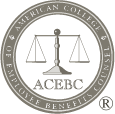Kirk F. Maldonado
Kirk F. Maldonado, who died in 2014 at age 63, was a prolific and respected author and speaker on employee benefits law issues. He was inducted as a Charter Fellow of the American College of Employee Benefits Counsel (the “College”) in 2000.
Kirk received his B.A. undergraduate degree from the University of Nebraska at Omaha in 1975, and his J.D. from Creighton University in Omaha in 1978. He was the Staff Editor of the Creighton Law Review from 1977 to 1978. He earned his Master of Laws of Taxation degree from Georgetown University Law Center in 1981.
He worked as an Attorney in the Employee Plans and Exempt Organizations Division of the Office of Chief Counsel of the Internal Revenue Service (“IRS”) from 1978 to 1981. From 1982 to 2003, he was in private practice at Stradling, Yocca, Carlson & Rauth in Newport Beach, CA, and then Riordan & McKinzie PC, Costa Mesa, CA (later Bingham McCutchen LLP which ceased operations in 2015). He moved to Denver, CO where he practiced at Sherman and Howard until he retired in 2008.
In 1986, Kirk received a U.S. Department of Labor (“DOL”) advisory opinion on the important issue of how to handle payment of a qualified retirement plan’s administrative expenses incurred in the operation of a plan. The March 2, 1987 letter with guidance from Elliot I. Daniel who also became a College Fellow (see https://www.acebc.com/profiles/elliot-daniel) was important for many retirement plans and advisors. It was commonly referred to as the “Maldonado Letter.”
Practitioners regularly poured over guidance and were interested in getting any extra bit of background to help interpret it. The Maldonado Letter itself hinted that issuing the guidance in that form was somewhat unusual: “Your inquiry relating to whether or not the payment by the Plan of the expenses described in your letter would be an appropriate expenditure of plan assets involves factual considerations with respect to which the Department will ordinarily not provide an opinion. (See section 5.04 of ERISA Procedure 76-1, 41 FR 36281, August 27, 1976.) Therefore the following discussion is intended to provide general guidance with respect to the various legal issues raised by your questions.”
College Fellow Roberta Casper Watson recalled Kirk describing an unexpected backstory behind his namesake ruling. Kirk maintained that the content of the Maldonado Letter was not at all what he had requested, and further, that he wasn’t given an opportunity to withdraw his request once he learned what the DOL would address. When the letter came out, people asked him why in the world would he – or anyone – request such guidance, Kirk explained that he didn’t request it: the DOL just sprang it on him and issued the letter.
Kirk’s professional activities included participating as a member of the Employee Benefits Committee of the Section of Taxation of the American Bar Association (“ABA”), where he was a constant presence in discussions on details of the law, and on the Committee on Continuing Professional Education Committee of American Law Institute-American Bar Association (“ALI-ABA”).
Kirk authored over 60 articles and publications, including Tax Management Portfolio #362, Securities Law Aspects of Employee Benefit Plans and Chapter 50, Employee Stock Ownership Plans of the Employee Benefits Handbook, published by Warren, Gorham & Lamont. He also became a respondent in a column in the Los Angeles Times for ten years. He served on the Editorial Advisory Board of the Benefits Law Journal in 1993.
He gave over 200 speeches, including presentations before such groups as ALI-ABA, the Practising Law Institute, and the ABA.
During his time working at the IRS Chief Counsel’s office, Kirk developed many close friendships, including future College Fellows Joel Horowitz, Nell Hennessy, Russell Greenblatt, and Chip Kerby. Joel noted that Kirk was energetic, good-natured, upbeat, and dedicated to his work. He took remarkable pleasure in discussing the intricacies of tax law well into the evening after others were ready to move on to refreshments or, at least, less rigorous topics. A former body builder whose daily lunch at the IRS involved raw cashews, a whole apple, core and all, and a soy milk and whey protein shake, Kirk loved practicing law and took a deep interest in the details of employee benefits. For Joel and many others, Kirk’s legacy was that of a dedicated practitioner and a kind, generous, friend.
Photo Source: The Decade Book, American College of Employee Benefits Counsel 2000-2010


